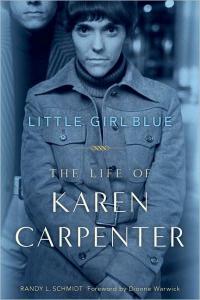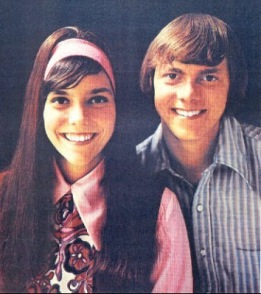Little Girl Blue: Remembering Karen Carpenter

February 4 marks the 33rd anniversary of the death of singer Karen Carpenter. One half of the Grammy-winning duo, The Carpenters, Karen tragically succumbed to cardiac arrest, caused by complications from anorexia nervosa, at the age of thirty-two. Her unmistakable, dulcet, smooth vocals helped elevate easy-listening hits such as “(They Long To Be close To You),” “Rainy Days and Mondays” and “We’ve Only Just Begun” to the top of the charts from the late 1960s through the mid-1970s. While the apparently squeaky-clean sister and brother seemed to have it all– hit songs, nice cars, money, and a worldwide fan base– both Karen and older brother Richard secretly battled demons. Richard was addicted to Quaaludes. Karen, more dangerously, fought an eating disorder that, back then, hardly anyone had heard of, starving herself and abusing laxatives to achieve a perilously low weight.
Randy L. Schmidt, a writer and music educator from Texas, is the author of the intimate, often heart-wrenching portrait of the triumph and turmoil that was the life of Karen Carpenter. The 2010 biography, Little Girl Blue:The Life of Karen Carpenter, years in the making, became a best-selling book.
A previous biopic of the Carpenters, by the late Ray Coleman, was “authorized” and therefore “sanitized” by the controlling Carpenter Camp, AKA brother Richard and mother Agnes. While Coleman’s book was somewhat informative and a decent read, Schmidt’s unauthorized account is far superior. It took years of meticulous research and dogged determination, pursuing interviews with Karen’s friends and colleagues, to complete this project. The result is a three-dimensional portrait of Karen not just as a talented singer and musician, but as a deeply hurting, lost soul. The reader can feel not not only Karen’s anguish, but the frustration that her loved ones must have felt, as they tried in vain to save her.
I was lucky enough to interview Randy Schmidt, just in time to commemorate the sad anniversary of Karen’s passing.

Author Randy L. Schmidt
What compelled you to write a book about Karen Carpenter’s life in the first place?
I became a Carpenters fan in 1989 while watching the CBS-TV movie, The Karen Carpenter Story. I started researching the next week and began collecting everything I could find, notably information. In 1995 I created the Newville Avenue Carpenters Mailing List, an online group of fans, and soon became a bit of an Internet Carpenters guru. In 2000, I compiled and edited Yesterday Once More: Memories of the Carpenters and Their Music, a compendium of favorite articles, interviews, reviews, and more. One thing led to another and I ended up doing some interviews with some of the duo’s friends and associates. Those interviews and years of research proved to be the basis for what became Little Girl Blue. It’s funny . . . I kept waiting for someone to write the Carpenters book I wanted to read, but ended up doing it myself!
How long did it take you to complete?
I worked off and on for 8-10 years to complete the book. It took many detours, but finally came together in 2008 enough that I felt ready to create a book proposal. I sent it to three publishers and two of them wanted the book!
Was it hard to contact Karen’s old friends, colleagues, producers, etc.?
At times, yes, it was difficult to find people or to get them to participate. Some were so loyal to Richard that they weren’t receptive. Others spoke to me only after learning Richard was not associated with the project. It was a maze. Or a puzzle. One piece led to another. One step informed the next.

Karen and Richard Carpenter in the very early stages of their career
Why is Richard so reluctant to give interviews or talk about Karen, other than the music they made together?
He has stated many times that he’s said all he wants to say about Karen and her personal life. It’s a shame. She should be celebrated and her story shared with the world. He declined to be interviewed, which was not a surprise. He rarely lends his name and likeness to any projects he doesn’t initiate himself.
Karen’s fans basically badgered Richard, demanding the release of Karen’s solo album, a project he disapproved of. He finally complied in 1996. Likewise, the Carpenters’ version of “The Rainbow Connection” wasn’t released until 1999, when Richard finally completed an arrangement that was satisfactory to him. Do you know if there’s more unreleased Carpenters music that Richard is hoarding?
Not much, if any. I think most of what’s left is deemed to be outtakes and snippets unworthy of release. True, he felt that way about other material that eventually made it to albums and collections, but there hasn’t been much of anything “new” surface in the last 12 years or so. There are some early demos from the Richard Carpenter Trio, Spectrum, and even alternate versions of Carpenters songs, but I don’t hold my breath on these being released. A new box set might be the way to release something like this, but it seems like Richard has left the music business and is focused on family matters now.

Karen’s long-delayed solo album
Do you know if Karen kept a diary?
Yes, or at least a detailed datebook. I believe it was biographer Ray Coleman who called it a “diary.” I have never seen it.
Who would you say was the most helpful out of the many contributors to Little Girl Blue? Are you still in touch with any of them?
Frenda Franklin and Karen “Itchie” Ramone were most helpful. They were her closest friends and had so much insider info that no one else would know about. I am still in touch with many of the contributors, at least from time to time. Her childhood friend Frank Bonito is someone I email with almost every week. She had some amazing friends and they are still wonderful people who just want to see her memory respected.
One shocking revelation in your book is that in addition to laxatives and diuretics, Karen was taking thyroid pills in order to speed up her metabolism. These can only be obtained with a doctor’s prescription. As thin and fragile as she was at the time, it seems unthinkable that any doctor would give her these pills. It reminded me of Michael Jackson’s doctor giving him propofol, which ultimately killed him. Was it ever found out who prescribed these pills to Karen? I’d think there should have been a medical malpractice lawsuit!
No, I have no idea who prescribed those for Karen. I do know that she had numerous doctors and pharmacies, so it’s likely that they were unaware of one another. A Dr. Feelgood type of deal, I imagine. People in the entertainment industry never seen to have trouble getting whatever it is they’re looking for.

Karen, in the throes of anorexia
This next question is almost impossible to answer… It’s more of a “what do you think” scenario. If Karen had survived her cardiac incident on February 4, 1983, do you think it would have served as a wake up call for her to finally stop abusing her body? Or do you think she would have done what she’d done before: gain some weight back, only to go back to her old ways?
I think she needed to do more than just repair her physical health. I feel she would have had to have stood up to those controlling her life. She needed to put her mother in her place and establish herself as a grown, independent woman. It may have alienated her for a while, but would have done wonders in the long run. I believe most of Karen’s issues were emotional/relational. The family had no boundaries and Karen needed to set up some very strict boundaries. Had she taken charge of these things, I think she could have started to heal.

After so many years of hard work, what was the most rewarding thing about finally getting your book published?
Just knowing the story was out there . . . entertaining and informing people all over the world. That was so meaningful and rewarding. Holding the book in my hands for the first time was a pretty awesome feeling . . . Seeing it in libraries . . . Then the reviews started coming in, bestseller statuses, and so on. I just couldn’t believe it. Even five years after its publication, the book is still a living thing. People are still talking about it and going to it as the main source for Carpenters info.
Finally, are you working on any new books? Who would you like to write about next?
I am working on a “Dolly Parton on Dolly Parton” book in the “Musicians in Their Own Words” series for Chicago Review Press, the publisher of Little Girl Blue. It should be out in 2017. I also have a few children’s books I am working on, including one about Karen. Hoping to see some of those through to publication later this year.
Randy L. Schmidt is also the editor of Judy Garland on Judy Garland, a compilation of interviews and encounters with yet another musical legend whom we lost too soon.
- Posted in: Authors ♦ book reviews ♦ Books ♦ eating Disorders ♦ music ♦ Musicians ♦ Writers
- Tagged: 1970s, 1983, Anorexia, Anorexia Nervosa, author, Author interviews, biographer, biography, book reviews, bulimia, Carpenters, Close To You, Easy Listening, interviews, Karen Carpenter, music, music history, Randy Schmidt, Richard Carpenter, Superstar